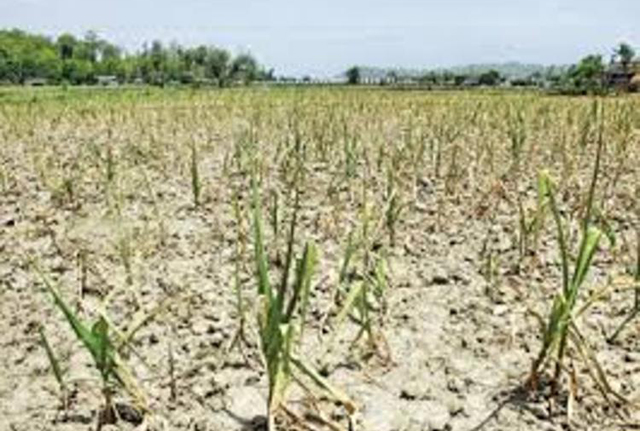Crop situation gets dire

Elita Chikwati Senior Agriculture Reporter
Erratic rains and high temperatures being experienced countrywide have resulted in crops wilting, with farmers in some areas already counting losses as their maize is now a write off.
The worst affected crops are maize, dryland tobacco, which is now showing false ripening and some small grains that are now showing signs of wilting. The Meteorological Services Department has forecast little and isolated rainfall activity over the country, with the dry and hot conditions continuing.
MSD head of forecasting Mr Tich Zinyemba yesterday said residual moisture coupled with high day time temperatures could cause some light rain showers and isolated thunderstorms from today until Friday, mainly in all Matabeleland provinces, Mashonaland provinces, Harare Metropolitan and parts of north of Manicaland.
“During this period, it is forecast that daytime temperatures should average between 28 degrees Celsius and 37 degrees Celsius,” he said. “This is likely to cause more distress to crops already overburdened by moisture stress and bring discomfort to both humans and animals.
“Direct exposure to solar radiation should be kept to a minimum, especially during the hottest part of the day, which is between 11am and 3pm. The public is, therefore, advised to put on wide brimmed hats when working in the open.”
The SADC Climate Services Centre recently issued a heat wave alert from Saturday January 20 to today.
“People in most of Botswana, south eastern tip of Angola, south-west Madagascar, southern tip of Malawi, south and west central Mozambique, eastern and south Namibia, north and western South Africa, eastern Swaziland, extreme north east of Tanzania, extreme southern Zambia, extreme north, south and western Zimbabwe should adhere to healthy advisories to combat the high temperatures, that will be experienced in these areas,” it said.
“Extremely high temperature will be experienced in a select few areas within the region, where extra caution needs to be undertaken.”
But Mr Zinyemba said Zimbabwe was unlikely to be affected by the heat wave. Agriculture, Mechanisation and Irrigation Development Deputy Minister, Davis Marapira, expressed concern over the general crop condition.
“The dry conditions have seriously affected plants, especially those at tasselling stage. In some areas, the irrigated crop has been affected as water sources are dwindling. We should concentrate on water harvesting and development of bigger water reservoirs. The country should develop water systems into irrigation facilities. We are also concerned with the heavy siltation of water sources which is being caused by illegal settlers,” he said.
Agritex has confirmed that farmers are worried over the erratic rains and high temperatures. In Mashonaland Central, the most affected area is Rushinga, where 10 percent of the planted maize has reached permanent wilting stage.
Tobacco is also showing signs of false ripening due to the high temperatures, while cotton is doing well. In Masvingo, hot temperatures have affected crops, with maize in Chivi, Zaka and Gutu reaching permanent wilting point.
Small grains are also showing signs of moisture stress in these areas. Some farmers had planned to plant in January and these have not been able to do so because of the dry weather conditions. In Mwenezi and Chiredzi, farmers are being urged to mobilise supplementary feeding for their livestock as the dry weather conditions are also affecting animals.
In Matabeleland North, Agritex revealed that crops are in three categories. The first stage that has been severely affected is at reproductive stage, while the bulk of the crop which is at temporary wilting is at vegetative stage.
The smaller crop is in good condition, although the high temperatures have increased evapotranspiration. Fall armyworm has also become a challenge in areas such as peri-urban Bulawayo, Umguza, Bubi, Nkayi, Lupane, Binga and Hwange.
In Tsholotsho, Hwange, Binga and Lupane, small grains are at temporary wilting stage and the farmers are hoping that the crops can hold longer because they can tolerate high temperatures and dry conditions.
In Manicaland, Agritex said no rains had been received in some areas this year. Crops under irrigation are in a better condition although the irrigated crop is 10 percent of the total planted crops. Farmers who planted late are experiencing a poor germination rate.





Comments